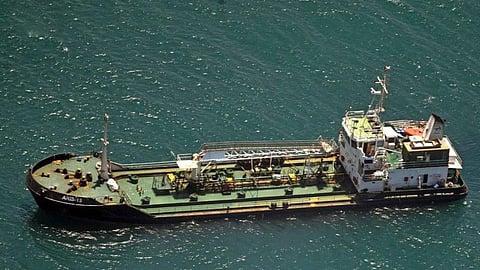

COLOMBO: A former Sri Lankan navy chief who is now an academic, Admiral Dr. Jayanath Colombage, has said that the seizure of an oil tanker by Somali pirates in the Horn of Africa on March 13 after a gap of five years, shows that there is an urgent need for a holistic approach to piracy which should include political, economic, military, administrative, legal and financial components.
The pirates had seized the bunkering tanker Aris 13 while it was sailing from Djibouti to Mogadishu. Flying the Comoros flag, the 1188 ton vessel was owned by a company based in Fujairah in the UAE, but the eight-man crew was entirely Sri Lankan. Hence the great concern in Sri Lanka over the incident.
While the shipping company in the UAE was negotiating with the pirates, the Sri Lankan government asked the US Ambassador in Colombo, Atul Keshap, and the 41-nation Combined Maritime Force led by an American Admiral based in the UAE, to use their contacts to get the hapless crew released without harm.
The US, which had a ship and personnel from the Seventh Fleet in Hambantota at that time carrying out a joint exercise with the Sri Lankan navy, got the President of the Puntland autonomous region of Somalia to intervene. The nail-biting drama ended late in the night of March 16-17, with the Puntland President sending a WhatsApp message to the Sri Lankan Deputy Foreign Minister Harsha de Silva to say that the crew and the ship were released without ransom.
The Sri Lankan naval spokesman, Lt.Commander CRP Walakuluge, pointed out that Aris 13 had no Sea Marshals on board; had no naval escort; was a slow vessel going at an average speed of 5 knots; and was hugging the coast rather than going through the open sea in order to save fuel.
“Little wonder the vessel attracted pirates,” he said.
Multilateral naval cooperation and provision of naval escorts to ships had reduced the demand for Sea Marshals since 2012. Companies hiring out Sea Marshals were charging a lot - US$ 200 to 300 dollars per man, per day. With each voyage having to have at least four Marshals, if not more, the security bill per voyage was US$ 20,000 to US$ 25,000.
According to Adm. Colombage, shipping companies often do a calculation to see the statistical probability of a vessel being hijacked, and fix the security systems accordingly.
“ It all boils down to the question of money,” he said.
However, Adm. Colombage feels that the reason for the re-emergence of piracy has to be seen in the objective conditions prevailing on land as well as the sea.
“The roots of piracy are on land and not in the sea. The sea is where piracy takes place, but it stems from conditions on land,” he pointed out.
“Piracy is basically big business with international links as well as local political, official and business connections. Intelligence gathering is done internationally through agents, and the money collected is shared as per systems spread across borders. The boats, weapons and the men are hired and trained professionally. The actual pirates get only the crumbs. It is the big fish on land who get the lion’s share. Therefore any attempt to curb piracy has to be done not only at sea but on land too,” he reasoned.
He pointed out that piracy, like all crimes, thrives under political confusion, absence of a firm and normative administrative system, lawlessness, corruption and violence. And there is political confusion
in Somalia and the Puntland autonomous region.
Following the February elections in Somalia, Mohamed Abdullahi Mohamed took over as President. But the opposition Al Shabaab group threatened to eliminate anybody cooperating with the regime. Al Shabaab had assassinated the National Intelligence Agency chief. It had cashed with the Somalian National Army. In the Puntland autonomous region, the regime is opposed by a pro-ISIS Islamic group which has been beheading its opponents in the classic ISIS style. And while lawlessness reigns, the UN has warned that Somalia is heading towards famine.
To this, Adm.Colombage adds the devastation caused by international fishing off the coast of Somalia. It has denied Somali fishermen their livelihood and driven into the arms of pirate recruiters, he said.
There are flaws in the international maritime security system. The Convention for the Suppression of Unlawful Acts against Safety of Maritime Navigation, covers terrorism but not piracy. There are also
no rules for the prosecution and jailing of captured pirates. With the result, captured pirates are let off. Cases cannot be taken to the International Criminal Court as there are issues of jurisdiction plaguing the ICC.